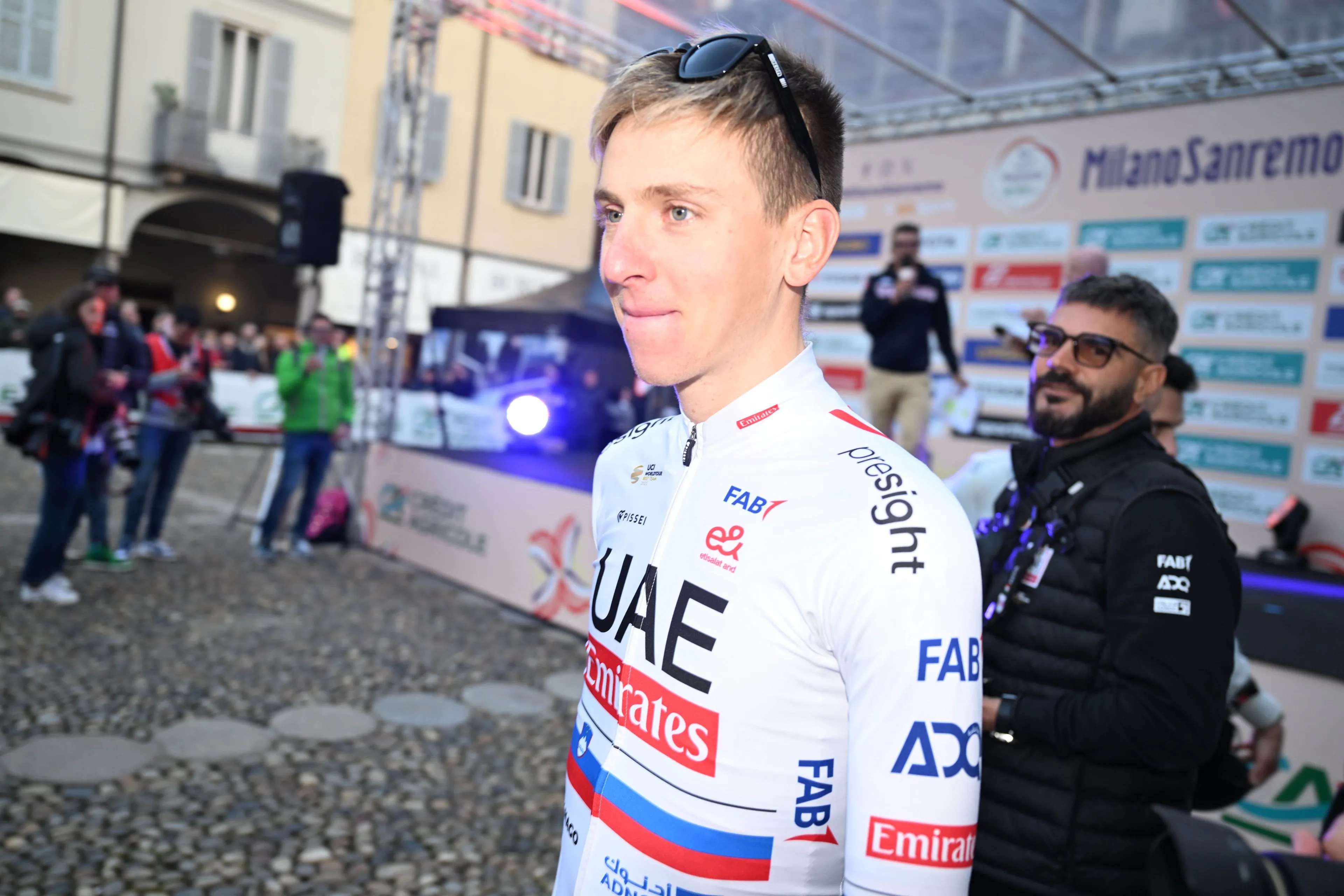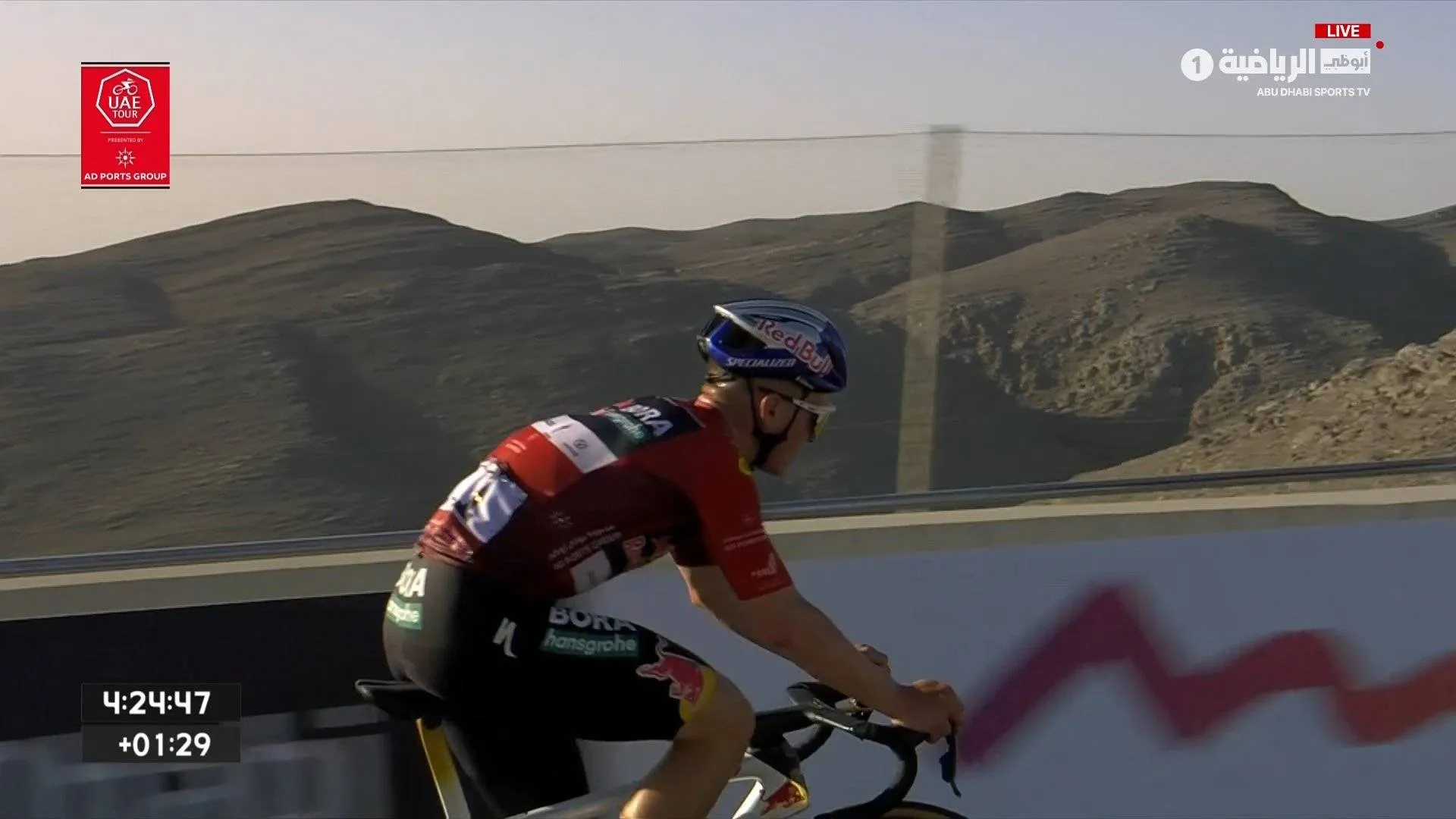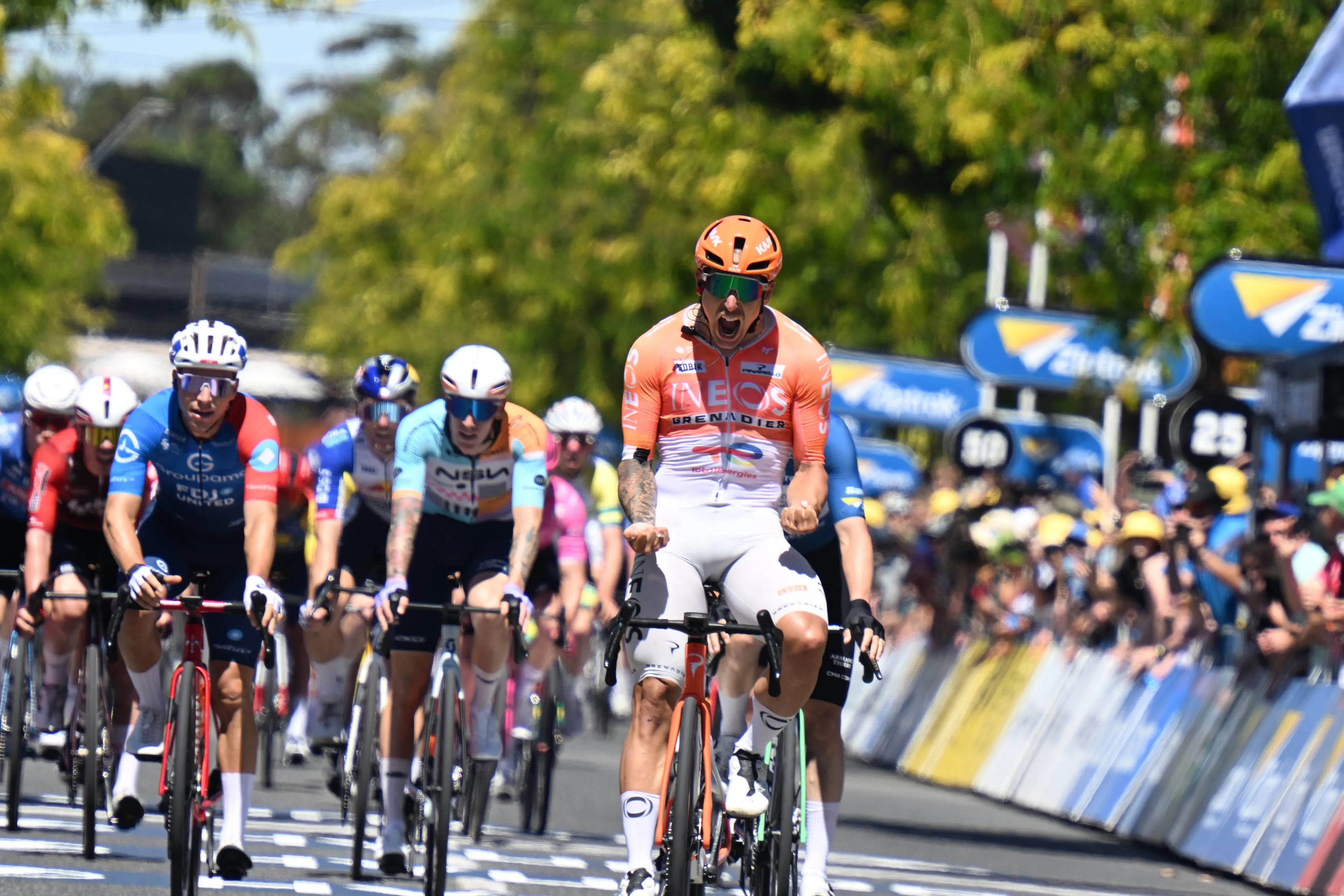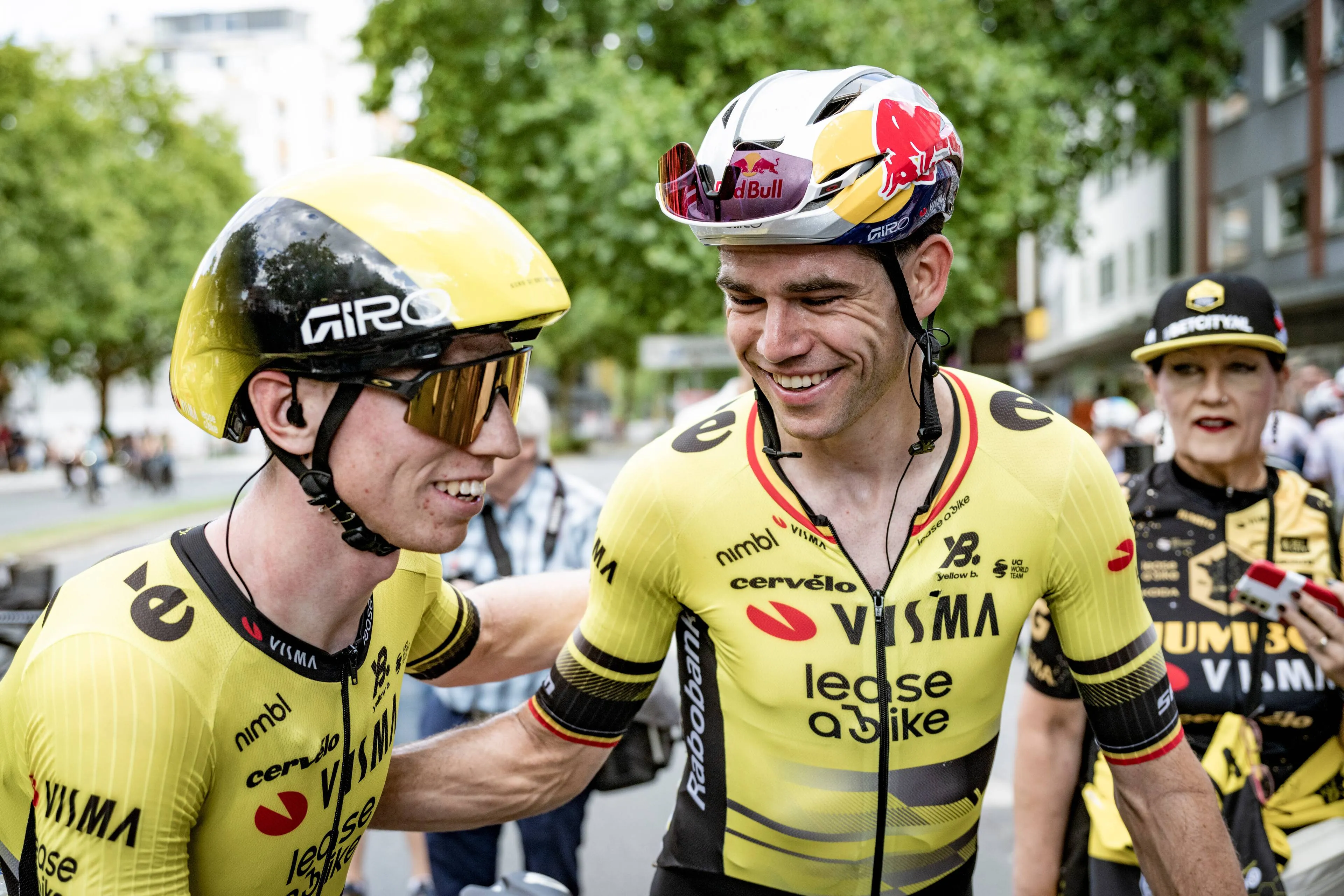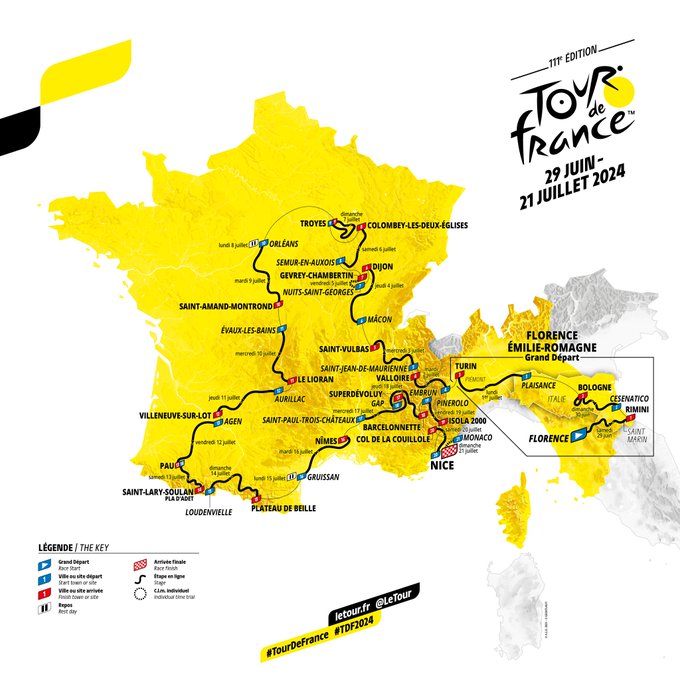PREVIEW | Tour de France 2024 - GC fight with Tadej Pogacar, Jonas Vingegaard, Primoz Roglic, Remco Evenepoel, Tom Pidcock and more!
CyclingSaturday, 29 June 2024 at 09:34
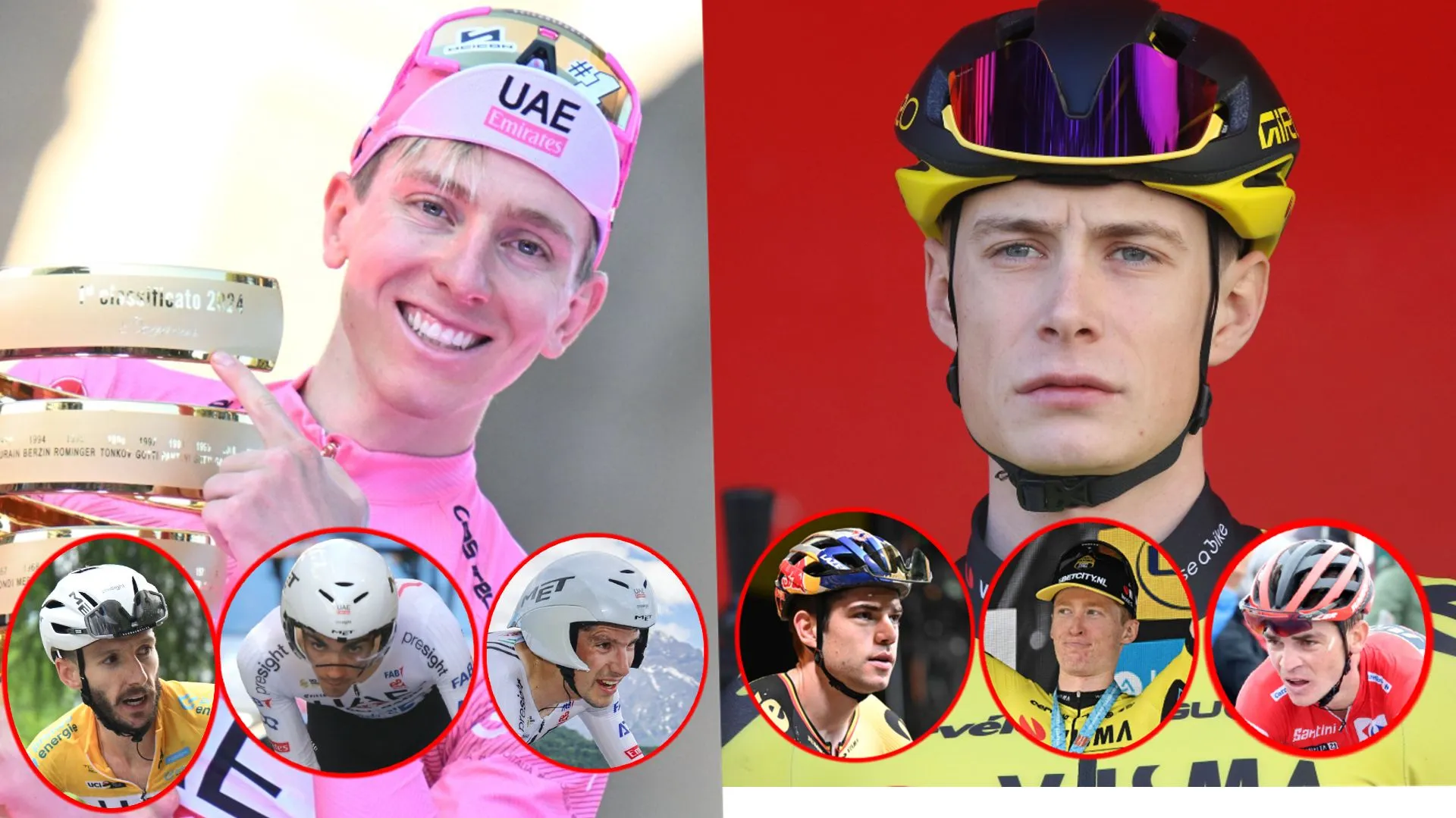
The 2024 Tour de France promises to be a unique edition, starting with its Grand Depart in Florence and Emilia-Romagna, just over the border in Italy. For the first time in many years, the race will conclude away from Paris, with riders heading to Nice for the finale. Scheduled from June 29th to July 21st, we preview the anticipated battle for the overall classification over the next three weeks.
Read also
Stage 1: Florence - Rimini
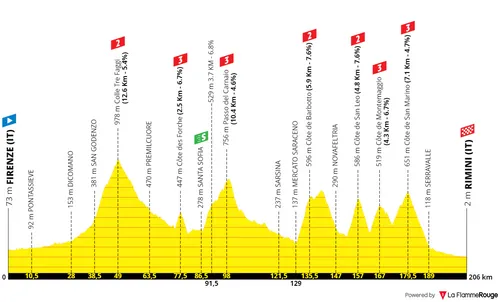
Stage 1: Florence - Rimini, 206 kilometers
The Tour de France starts in Florence this year. In the heart of Italy, the race organizers have cooked up an opening stage with 3700 meters of climbing. This includes six categorized climbs, a very hilly finale before the flat run-in to Rimini where the first yellow jersey will be attributed.
Stage 2: Cesenatico - Bologna

Stage 2: Cesenatico - Bologna, 200 kilometers
Stage 2 may be the first day of the race where the overall classification can explode. The first day certainly has potential for it, but on the second day of racing the riders climb up the Madona di San Luca on two occasions. The climb - which is raced every year at the Giro dell'Emilia is short but very steep and explosive, and can create differences before descending back into town for the finale.
Stage 3: Piacenza - Torino
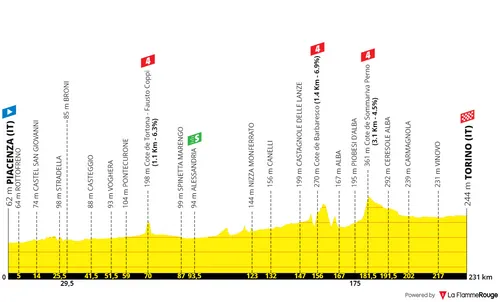
Stage 3: Piacenza - Torino, 229 kilometers
The sprinters will finally have their first real opportunity on stage 3 of the Tour. It's a transition day, a whole 229 kilometers on the menu but overall one of the flattest days of the race. The stage finale will be in Torino, a city which has already hosted the finale of the first stage of the Giro d'Italia this year.
Read also
Stage 4: Pinerolo - Valloire
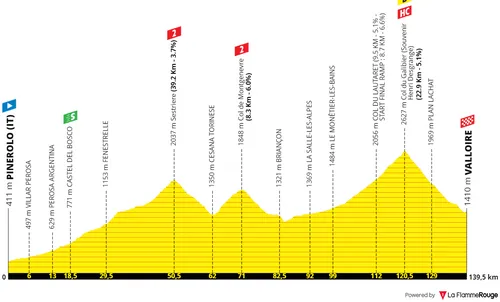
Stage 4: Pinerolo - Valloire, 138 kilometers
And on day 4 of the race, the peloton crosses the border into France, through the Alps. But this will not be an easy or transition day, instead the first day in the high mountains. After climbing 1600 meters of altitude into Sestrière, the GC riders will have their first taste of true climbing in this race and they will do so all the way into the Col du Galibier.
Via the Col du Lautaret, this is the easier side of the hugely popular climb, but with 23 kilometers at 5% (the steepest towards the summit) and altitude of over 2600 meters at the summit, big differences can be made before the downhill finish into Valloire.
Stage 5: Saint-Jean-de-Maurienne - Saint-Vulbas
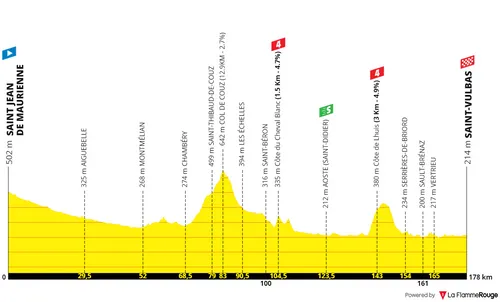
Stage 5: Saint-Jean-de-Maurienne - Saint Vulbas, 177 kilometers
On the fifth day the race starts in the Alps, on the hub city of Saint-Jean-de-Maurienne, but it will be a day for the sprinters as the riders head out of the mountains. We will certainly have a bunch sprint in the industrial area of Saint Vulbas.
Stage 6: Mâcon - Dijon

Stage 6: Mâcon - Dijon, 163 kilometers
Stage 6 of the Tour should be a calm day on the bike, with only 163 kilometers to race, mostly completely flat with a finale into Dijon.
Read also
Stage 7 (ITT): Gevrey-Chambertin - Nuits-Saint-Georges
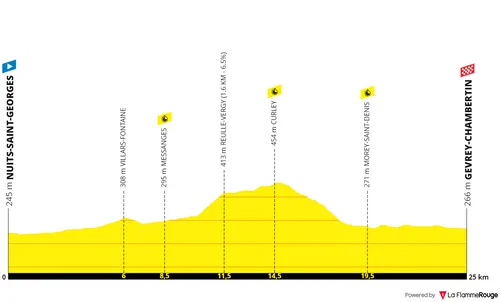
Stage 7 (ITT): Nuits-Saint-Georges - Gevrey-Chambertin, 25 kilometers
The first time-trial of the race. The Tour has steered away from flat time-trials but this is the one, if you could call it that. There is a small ascent and descent halfway through the 25-kilometer course ending in Gevrey-Chambertin, but most of the route will allow the specialists to make some differences.
Stage 8: Semur-en-Auxois - Colombey-Les-Deux-Églyses
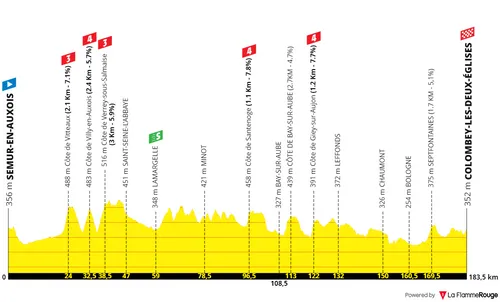
Stage 8: Semur-en-Auxois - Colombey-les-Deux-Eglises, 176 kilometers
Stage 8 is an interesting one, most likely for the sprinters, but throughout the 176 kilometers there will be plenty small ascents. A rough day to control and a difficult one for the pure sprinters; it also provides a good opportunity for breakaways and late attacks.
Stage 9: Colombey-les-Deux-Églyses - Troyes
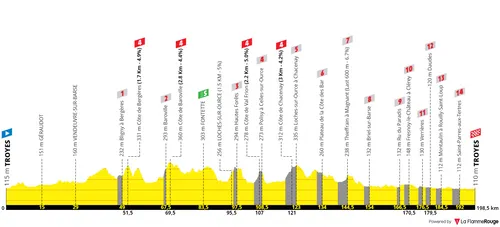
Stage 9: Troyes - Troyes, 199 kilometers
Perhaps the most anticipated stage of the whole race! In the second Sunday of the race the peloton will start and finish the stage in Troyes. A loop which will include 14 sectors of gravel roads, totaling to 32 kilometers in total (most of which in the final two thirds of the stage). There are hills also to contest in the day, but into the city there will be plenty fast and treacherous sections.
Read also
Stage 10: Orléans - Saint-Amand-Montrond, 187 kilometers
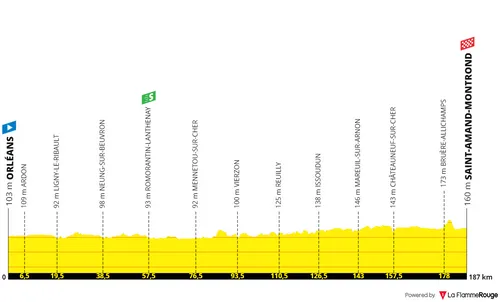
Stage 10: Orléans - Saint-Amand-Montrond, 187 kilometers
Stage 10 is the start of the second week of the Tour. An easy start for it, the day takes place from Orléans to Saint-Amand-Montrond is completely flat and a golden opportunity for the sprinters.
Stage 11: Evaux-les-Bains - Le Lioran, 211 kilometers
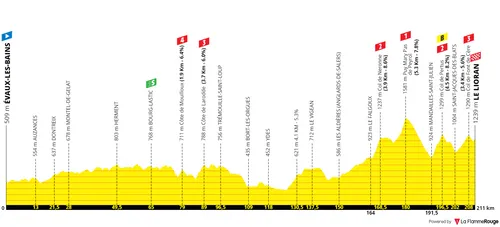
Stage 11: Évaux-les-Bains - Le Lioran, 211 kilometers
Into the Massif Central, the race is now heading south towards the Pyrenees. The beginning of the 211-kilometer stage is flat but the finale is rather hilly with four categorized climbs. The GC riders could have an interesting battle, but most likely we will have a breakaway contest for the triumph.
Stage 12: Aurillac - Villeneuve-sur-Lot
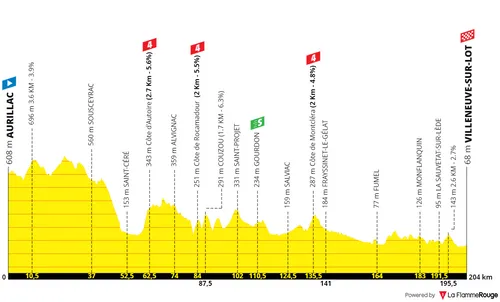
Stage 12. Aurillac - Villeneuve-sur-Lot, 204 kilometers
Stage 12 is a transition day through western France. It is 204 kilometers long from Aurillac to Villeneuve-sur-Lot, a day starting at relative high altitude and finishing close to sea level, with plenty small ascents en route to a finale where a bunch sprint is still the most likely scenario.
Stage 13: Agen - Pau
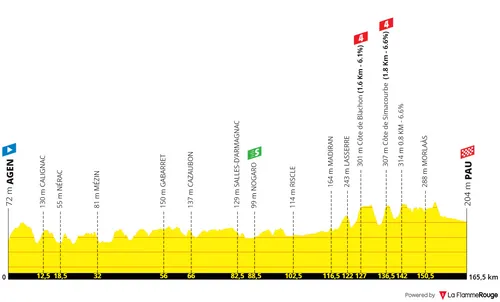
Stage 13: Agen - Pau, 171 kilometers
Another day for the sprinters, even if it includes perhaps more climbing than some would hope for. It's a treacherous day as the riders head into the base of the Pyrenees, the hilly start will provide an opportunity for the breakaway whilst the sprinters will look to take the glory on the day.
Stage 14: Pau - Pla d'Adet
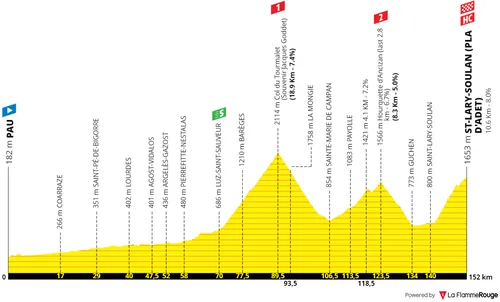
Stage 14: Pau - Saint-Lary-Soudal (Pla d'Adet), 152 kilometers
The race is back into the mountains and there is no warming up. The Tour keeps it's modern traditional formula, with a short stage featuring a flat start. So it will be very hard for a breakaway to stand any chances. The GC riders are likely to fight for the win in a day including the Col du Tourmalet, Hourquette d'Ancizan and finally a summit finish on the Pla d'Adet which is over 10 kilometers long at 8%.
Stage 15: Loudenvielle - Plateau de Beille
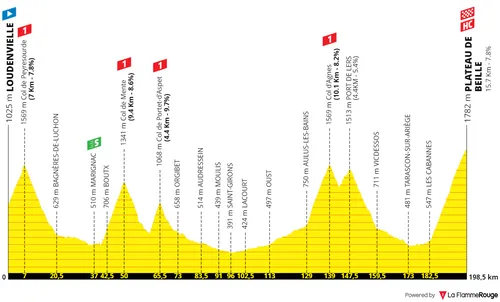
Stage 15: Loudenvielle - Plateau de Beille, 198 kilometers
The queen stage? Perhaps in a different edition yes, I wouldn't say it's the case here, but it is just a brutal mountain stage to wrap off the second week. With the rest day ahead the riders will not save themselves on a day with four first-category climbs and an HC summit finish. There will be 5000 meters of climbing and it is the stage with the most climbing meters.
The riders tackle the Col du Peyresourde right from the start of the 198-kilometer day. The Col du Mente and Col d'Agnes will provide very difficult obstacles throughout the day too; before the summit finish at Plateau de Beille which is 15.7 kilometers long at 7.8%.
Stage 16: Gruissan - Nîmes
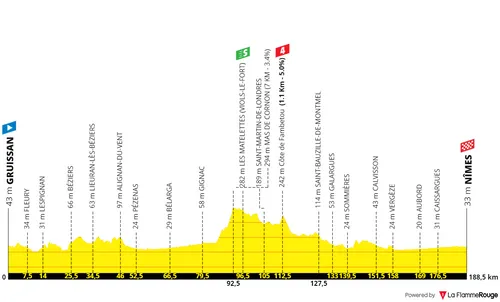
Stage 16: Gruissan - Nîmes, 187 kilometers
The third week begins with a sprint stage; perhaps the only one of the final week. This is a stage where the peloton moves east from the Pyrenees towards the Alps and finishes in the city of Nîmes.
Read also
Stage 17: Saint-Paul-Trois-Châteaux - Super-Dévoluy
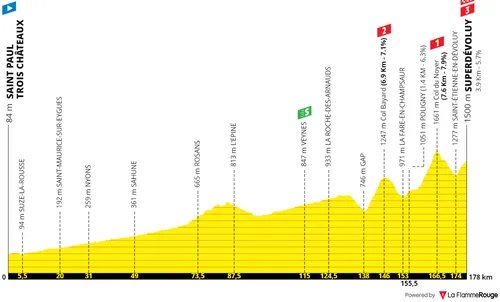
Stage 17: Saint-Paul-Trois-Châteaux - Superdévoluy, 178 kilometers
A mixed day. It is one where the breakaway should succeed but the start is completely flat. The GC riders could be called for action in the hilltop finish to Superdévoluy, which comes after the explosive Col du Noyer (7.8Km at 7.9%).
Stage 18: Gap - Barcelonnette, 179 kilometers

Stage 18: Gap - Barcelonnette, 179 kilometers
An interesting hilly day in the Alps, starting in Gap and finishing in Barcelonnette. The race organizers avoided adding any major climb to the day, but instead some small ascents. This is a day where a breakaway victory is almost certain, but some of the sprinters can climb and certainly a few teams may want to try and control the race for a final shot at a sprint victory.
Stage 19: Embrun - Isola 2000
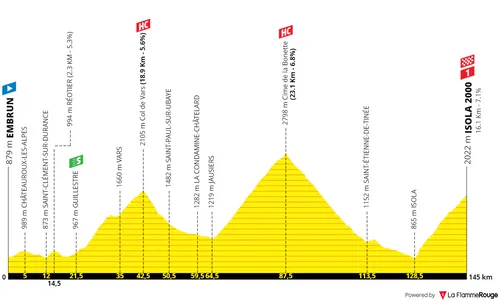
Stage 19: Embrun - Isola 2000, 145 kilometers
Another brutal day. Rather short with only 145 kilometers but with the Col de Vars early in the day, but then the Cime de la Bonnette... The climb summits at a scary 2800 meters of altitude, but the climb in itself is 22 kilometers long at 6.8% - perhaps the most difficult ascent of the whole race. But the riders won't be able to have a smile at it's summit, as the stage then descends back into the valley and climb up Isola 2000 (16.1Km; 7.1%) for the stage finish.
Stage 20: Nice - Col de la Couillole
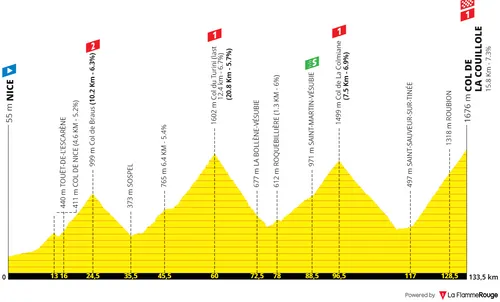
Stage 20: Nice - Col de la Couillole, 133 kilometers
Stage 20 will be the final day in the mountains for the Grand Boucle, short in distance however it'll be in the Alpes Maritimes that it'll take place, a rough day with four categorized climbs including the Col de Braus, Col de Turini, Col de la Colmiane and the Col de la Couillole - all frequent appearances as the queen stages at Paris-Nice.
Stage 21 (ITT): Monaco - Nice
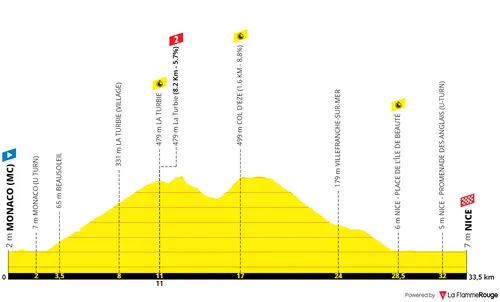
Stage 21 (ITT): Monaco - Nice, 34 kilometers
The final stage of the race. This 35-kilometer route will include the ascents to La Turbie (8.1Km; 6.5%) and a short hilltop to the Col d'Èze (1.6Km; 8.1%) before descending down to Nice where the race will finish this year. A different finale, from Monaco to Nice we are set for a big spectacle.
Read also
The Favourites
Tadej Pogacar & UAE Team Emirates - In my eyes the big favourite to win this Tour de France. Tadej Pogacar has ridden a formidable season with victories at Strade Bianche, Liège-Bastogne-Liège, Volta a Catalunya and Giro d'Italia. I truly do believe he has improved since last season and has virtually been unbeatable in his terrain. Very motivated, very explosive, and still unpredictable as a rider. He is very much a true leader with plenty allies in the peloton which may be an extra weapon to use again Visma. He dominated the Giro completely and won six stages, and is said to not have come out of it exhausted. Last year without ideal preparation he arrived at the Tour in flying form; so I have no doubt that even without recent racing he will do the same this time around.
I believe he will not lack in the high altitude or long ascents this time around. If he does manage to keep himself composed on those days against Vingegaard, then he can very well do the Giro-Tour double. But UAE have four leaders in reality. Juan Ayuso perhaps being the lesser after having crashed out of the Criterium du Dauphiné. The Spaniard is lined up to race the Tour right now for over a year and was always full of confidence. An incredible time-trialist, a brilliant climber and still so young... But consistency has not always been there and in a team with three other great stage-racers he will have to do a lot to prove himself worthy of not being in a supporting role. Third and fourth in the previous Vuelta a España editions, he certainly does have the legs to do that however.
Weapon number three is Adam Yates, podium finisher last year whilst supporting Pogacar and winner of the recent Tour de Suisse. The Briton is a brilliant pure climber and will be a very dangerous rider for the high mountains of weeks two and three. He is not explosive so it won't be easy to use him as a weapon to put Visma under pressure, but his consistency could prove to be a headache. João Almeida is virtually in the same position. The Portuguese is not an explosive or aggressive rider but provides another option for UAE. With strong time-trialing and great form ahead of his Tour debut, he can certainly be on the final podium, specially as he usually thrives in the final week - which this year at the Tour includes several very hard mountain stages.
Jonas Vingegaard & Team Visma | Lease a Bike - The big question of this year's race. Vingegaard won O Gran Camiño and Tirreno-Adriatico early in the year, he looked perfectly set for the spring with dominant climbing performances. The strongest climber in the world? Perhaps when it's in the high mountains and altitude, and we will have that all throughout the race. The Dane has not raced for almost three months since crashing at Itzulia Basque Country. Broken collarbone, ribs and punctured lung... These are not injuries that many can recover fully so quickly. But since he has not raced and his power numbers are not public, we simply don't know! One thing is for certain, he will enter the very hard start to the race on the defensive whilst UAE will certainly want to attack from day 1 to test him. If Vingegaard can survive the first week, he and Visma can become a true headache for the whole peloton when the race enters the Pyrenees.
We're not talking about an average rider, but instead the rider who has won the last two Tours ahead of Tadej Pogacar. This is a serious contender to win any mountainous race regardless of his form. Visma suffered with injuries, but these also brought Wout van Aert to his side for the next three weeks. A team with tremendous experience, filling all the gaps, and with great climbers all focused around this one proven leader. Paris-Nice winner Matteo Jorgenson has had a spotless season and could be the new Sepp Kuss... But Kuss himself is also present, albeit he will need better form than what he's shown recently in order to be of key support for the Dane.
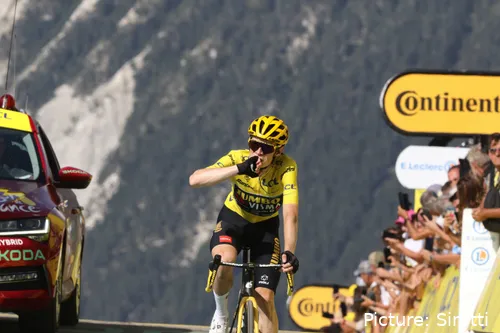
Jonas Vingegaard at the 2023 Tour de France. @Sirotti
Primoz Roglic & BORA - hansgrohe - Another big question. After having been made clear that he wouldn't lead Visma at the Tour de France against whilst Jonas Vingegaard was in the team, he left to lead a new team. Lucky him, the Slovenian found himself a new home where he will have a team fully focused in him, but the team is actually competitive against the likes of UAE and Visma. Roglic has won the Criterium du Dauphiné recently which was a great sign. I argue he is not as strong of a pure climber as the previous favourites, but in reality no-one is. Roglic could find his spark back and in the colours of BORA he has already gotten great support and days leading big races. Roglic wants to take vengeance and win the one Grand Tour missing from his palmarès.
In his support are the likes of Jai Hindley and Aleksandr Vlasov who are both in their own right strong GC contenders. A very good team which is also built around the Slovenian. Although I argue that if the race implodes and BORA has to work, behind these three riders there won't be too many present in the high mountains.
Remco Evenepoel & Soudal - Quick-Step - A big question. Evenepoel has won the 2022 Vuelta a España so you can argue that he is capable of surviving a Grand Tour. He is also well equipped with a team that includes Mikel Landa and Ilan van Wilder as support for the mountains. It's not the same as the riders above, but you can't say Soudal - Quick-Step haven't built themselves a block capable of supporting the Belgian as he needs. A calm and collected rider, he will likely aim for stage wins in the opening week and then ride himself to a good GC result, focusing on the experience and pacing himself in the mountain stages.
I don't see him as a winning candidate, and the podium is also very hard for now. A lot of people overestimate him as a climber. But he still is good, can be very dangerous in the hilly days, packs an incredibly strong time-trial and has become a very mature rider. I don't think he will feel the pressure that he did in his younger years.
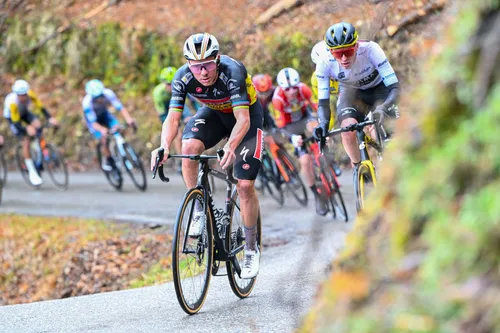
Remco Evenepoel at the 2024 Paris-Nice. @Sirotti
Carlos Rodríguez & INEOS Grenadiers - Rodríguez is a rider who I have plenty confidence in. He is not a pure climber, as he can definitely time-trial and also ride well in the treacherous days, but he is a rider that truly shows his colours when the peloton faces it's hardest days consistently. Rodríguez has won the queen stages of Itzulia Basque Country and Criterium du Dauphiné, whilst he also won the GC of the Tour de Romandie. Under the radar - because people usually focus on Roglic and Evenepoel - the Spaniard has in my opinion built himself as a bigger candidate than both of them. He won a stage at last year's Tour and often looked the best climber outside of Pogacar and Vingegaard.
He leads an INEOS that is very strong and experienced. But you could argue that there is a missing link in the team which is Tom Pidcock who will also go on to fight for the GC but as a free card within the team - not a supporting rider, but also one that won't be supported much. Egan Bernal is also an option for the GC although I'd say aiming for more than a Top10 is difficult. Laurens de Plus could be brilliant climbing support for all of them taking into consideration that INEOS won't likely have the responsibility, whilst Geraint Thomas could also be very important to support them if he finds his best form.
Simon Yates - Fourth last year and the Briton comes in with the same preparation this time around. What Team Jayco AlUla do is completely different than the rest; the Australian team have Yates and Chris Harper only to ride in the mountains. No pressure to disappoint the team as was the case last year and somehow it worked perfectly as he was consistent and a brilliant climbers all throughout. If he can have the same consistency this time around it's not impossible to repeat the result.
Enric Mas - The Spanish hope has spent the season riding a conservative calendar so as to focus on the Tour-Vuelta double. Naturally, he will hope to already show his best level at the Tour. Late 2022 Mas was an incredible climber who almost won the Vuelta a España and was able to match Tadej Pogacar at the time. A problem for the Spaniard is that Movistar cannot support him on attacks, the collective - like Jayco - is one that has no match. But a Top10, or Top5 at his best level, is completely possible. He was fifth in Catalunya, sixth in Romandie and seventh in Suisse.
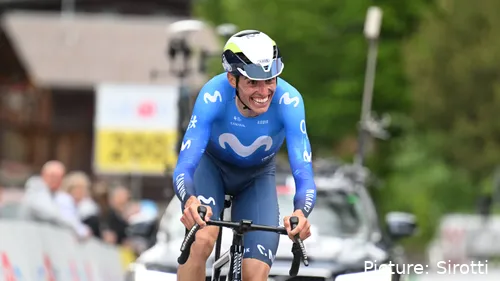
Enric Mas at the 2024 Tour de Suisse. @Sirotti
Felix Gall - The Austrian is perhaps the purest of climbers in the race. Nowadays all Grand Tour favourites are incredible time-trialists and so it's inevitable that he will enter the Pyrenees with a few minutes of delay... But realistically a Top5 is the very best the Decathlon rider can do, he remains a good candidate for the Top10 which would already be a good result. If not, hunting stages and KOM is very much possible for a rider who climbs so well. After winning the queen stage last year and finishing eighth last year, it'll be hard to improve on that. He has not looked to sharp this year with only Top10's at Paris-Nice and Tour de Suisse, but he should come into his own in the Grand Tour.
Richard Carapaz - It's hard to know how the Ecuadorian will do. Ever since joining EF Education he has never looked like a Grand Tour contender again, but I believe he will still try. The team already has plenty stage hunters and he can always do that if he struggles in the first two weeks at some point. Carapaz has won the queen stage of the Tour de Romandie this year proving his climbing legs are still there. Let's see if he will be able to contest for the podium as he's done in the past.
Pello Bilbao & Santiago Buitrago - Stage winner and sixth last year, I'd say Pello Bilbao reached the very best that he could realistically achieve at the Tour de France last year. I don't know if he will try to do the same, but the Basque rider is a lover of the Grand Tours and a specialist in backloaded races such as this one. He will be a good rider to chase a Top10, and his alternative approach to the race - at the Tour of Slovenia where he was second and won the queen stage - is a sign that he is looking for ways to still improve. Buitrago himself won a stage at Paris-Nice this year, but he has consistently looked like a great climber throughout the year and the young Colombian rider could try to aim for the overall classification as well.
David Gaudu - The Frenchman was fourth last year and is France's hope to perform on this race. The pressure is very high, this is not good, specially in a team that will focus on stages. I look at him similarly to Carapaz, where at his best a Top10 is possible but most likely chasing stage wins would be the wise decision. But I know he will try, despite testing positive for Covid-19 this weekend. He was ninth last year, so it's possible to repeat a similar result.
Louis Meintjes - Meintjes is a rider that is dialed to ride for the overall classification regardless of what happens. In 2022 he was seventh here and tenth at the Vuelta a España. Last year he abandoned whilst fighting for the Top10. The Intermarché rider is not explosive and fighting for a stage win would be a tough task. Finishing on the Top10 with such a strong field and little team support would be a great achievement and I recon perhaps the most impressive as every year the peloton climbs better.
Prediction Tour de France 2024 overall classification:
*** Tadej Pogacar, Jonas Vingegaard
** Adam Yates, João Almeida, Carlos Rodríguez, Primoz Roglic
* Juan Ayuso, Sepp Kuss, Matteo Jorgenson, Jai Hindley, Aleksandr Vlasov, Remco Evenepoel, Egan Bernal, Simon Yates, Enric Mas, Felix Gall
** Adam Yates, João Almeida, Carlos Rodríguez, Primoz Roglic
* Juan Ayuso, Sepp Kuss, Matteo Jorgenson, Jai Hindley, Aleksandr Vlasov, Remco Evenepoel, Egan Bernal, Simon Yates, Enric Mas, Felix Gall
Pick: Tadej Pogacar
claps 10visitors 5
Just in
Popular news
Latest comments
- Great champion Remco but his profile is more suitable for Ardennes-like races and tour with no very hard climbs. Not only Tadej and Vingegaard, there are a lot of younger cyclists (del Toro, Ayuso, maybe Seixas, Nordhagen and others) that will soon be big GC boys.
 maria2024202418-02-2026
maria2024202418-02-2026 - Evenopoel 1st real test, and he failedZamorano18-02-2026
- Remco is not the natural climber that riders like Tadej or Jonas are, no matter how much he trains and prepares for it. Yes, you can TT your way up moderately steep hills, but when the gradient gets super steep, he just can't keep up.
 santiagobenites18-02-2026
santiagobenites18-02-2026 - So against the better riders and a long mountain, Remco cracked. Sorry but way away from Pog and Jonasabstractengineer18-02-2026
- “I was portrayed as the devil" Bruyneel was really a talented team manager. His minor flaws: "coordinated, well-funded, and sophisticated doping regime" "hand-in-hand in implementing the team-wide doping programme" "was involved in trafficking and administering prohibited substances and methods, including EPO, blood transfusions, testosterone, human growth hormone, and cortisone. Teammates testified that nothing significant happened without Bruyneel's knowledge and approval." "fostered an environment where doping was considered a "fact of life" and necessary for success, effectively making it a condition of survival on the team. He also participated in or assisted with the cover-up of positive tests and doping violations." Those quotes show Bruyneel's true talent.Cyclingnut18-02-2026
- Fed up hearing "their" voicesslappers6618-02-2026
- When you join Ineos , learning , time , no pressure go out of the windowabstractengineer18-02-2026
- The UCI screws up againcaptmike18-02-2026
- No matter what people say - I'll watch it. And I bet all the complainers will do it too....averagecyclist18-02-2026
- Exactly what I'm thinking about it. Moreover Van Glis had a lot of time to rethink his situation but decided to stay where he was.averagecyclist18-02-2026
Loading
6 Comments


